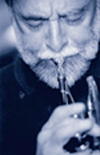
|
|
|
|
|
|
Photo Credit: Jeffrey Kliman |
Marvin Stamm
Trumpeter and educator Marvin Stamm brings on the heat as he guests on Billy Taylor's Jazz at the Kennedy Center. Although in jazz circles his is not a household name like Clifford Brown or Freddie Hubbard, Stamm plays with a similar hot-blooded passion. He may not have been popularly known, but Stamm was quite ubiquitous on the studio music scene during the 1960s and 1970s when he played with a "who's who" of outstanding artists ranging from jazz legends such as guitarist George Benson and saxophonist Gato Barbieri to R&B sensations James Brown and Patti Austin. After demonstrating his rhythmic agility, crisp articulation and fierce swagger on a jumping rendition of "There's No Greater Love," Stamm talks about growing up in Memphis, Tenn., where he listened mainly to R&B and blues on local black radio stations. After Dr. Taylor asks him about pianist and Memphis jazz patriarch Phineas Newborn, Stamm tells the audience that he first heard Newborn through recordings. Stamm continues with childhood anecdotes by mentioning trumpeter Clyde McCoy, whose recordings inspired Stamm to pursue a career in music. He joins Dr. Taylor's trio in an understated reading of Wayne Shorter's "Footprints," an appropriate closer for Stamm's recollections of his childhood. Although jazz has always been Stamm's first musical love, his career as a jazz trumpeter has been eclipsed by his work as a studio musician. The trumpeter talks with Dr. Taylor about the challenges of changing some people's perceptions about him as a jazz artist. In addition, Stamm sheds light on his experiences with European classical orchestras and on some of the different approaches to playing European classical music as opposed to jazz. Stamm then switches from trumpet to flugelhorn for a heartfelt version of "You Don't Know What Love Is." Dr. Taylor kicks off the show's customary Q&A portion by asking Stamm about his experiences as a trumpet clinician. Stamm reveals the importance of realizing that in a clinic he's there to help aspiring musicians, not to showboat. He then tells the audience about some of the lessons he learned while working with Stan Kenton. Stamm and Dr. Taylor take a breather from audience questions with a sumptuous rendition of the Brazilian classic, "Corcovado." A question regarding the musicians' inspirations follows. Dr. Taylor asks Stamm about his commentary writing, in which he addresses touchy issues such as racism, sexism and ageism. Stamm and Dr. Taylor conclude the evening with a samba-driven take on "Alone Together."
|
|
| |
